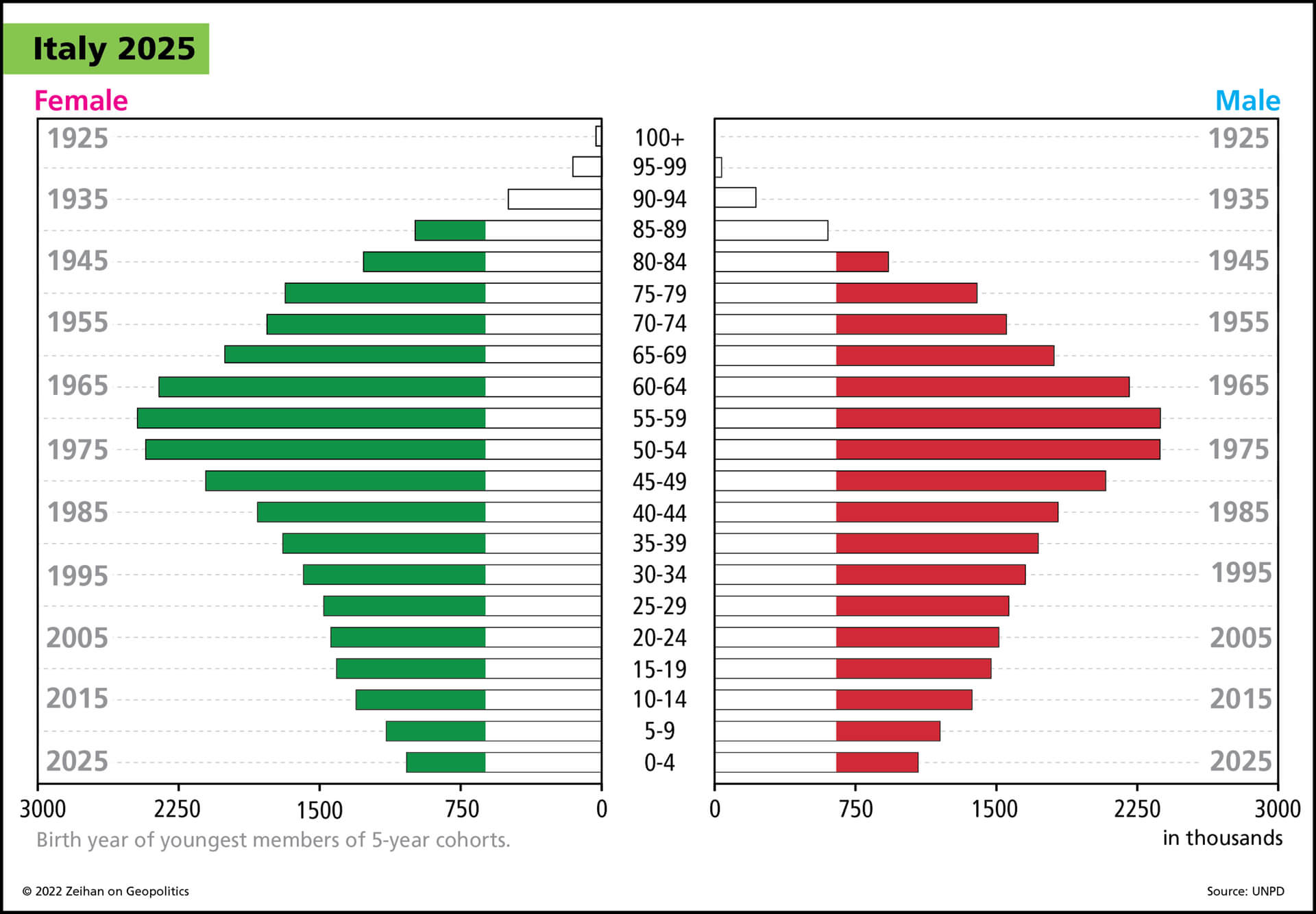While the Italians may have mastered the arts of pasta, wine and gelato, they should have been spending less time in the kitchen and more in…another room. That’s right, we’re looking at the demographic problems facing Italy, and Genoa will be our example.
The population of Genoa in 1972 was 950,000. Today, it is under 680,000. The scary part is that Genoa isn’t an isolated instance. Italy’s birth rate has been below replacement level for over 75 years, leading to an aging population and a shrinking tax base. The scarier part is that Italy is just one example of a country facing demographic collapse, as places like Germany, Romania, and Spain are all in the same boat.
Unfortunately, there’s really no practical solutions for these countries to remedy this issue. Sustaining their economies and state functions without a younger generation won’t be easy, but at least we’ll see how nations can adapt to these demographic challenges.

Here at Zeihan On Geopolitics we select a single charity to sponsor. We have two criteria:
First, we look across the world and use our skill sets to identify where the needs are most acute. Second, we look for an institution with preexisting networks for both materials gathering and aid distribution. That way we know every cent of our donation is not simply going directly to where help is needed most, but our donations serve as a force multiplier for a system already in existence. Then we give what we can.
Today, our chosen charity is a group called Medshare, which provides emergency medical services to communities in need, with a very heavy emphasis on locations facing acute crises. Medshare operates right in the thick of it. Until future notice, every cent we earn from every book we sell in every format through every retailer is going to Medshare’s Ukraine fund.
And then there’s you.
Our newsletters and videologues are not only free, they will always be free. We also will never share your contact information with anyone. All we ask is that if you find one of our releases in any way useful, that you make a donation to Medshare. Over one third of Ukraine’s pre-war population has either been forced from their homes, kidnapped and shipped to Russia, or is trying to survive in occupied lands. This is our way to help who we can. Please, join us.
Transcript
Hey everybody. Peter Zeihan here. Coming to you from Genoa, Italy. And I’m going to do something a little bit different today. I am going to show you the world through my eyes. Let’s turn this around. We’re over the business district in the central Genoa, and it’s not the buildings in the foreground I want you to see. It’s the ones in the background.
The ones that are in more residential. You’ll notice that not a lot of them have a lot of lights on it. And over here we’re starting to go a the old town similar situation. And as we move over here you can see the train station kind of Grand Central if you will, and then up on the hill is mostly residential spots.
But you’ll notice that even though it’s 10:00 at night, which is, you know, when everyone’s getting home from dinner in Italy, most of the buildings are less than one third lit up. Some of them, well, less than a quarter. the issue is that for the entirety of my life, Genoa one has been shrinking in population terms.
And I turned 50 this year. 1972 was the last year that the city saw it increase in population. And that is pretty typical for Italian cities writ large. Unfortunately, Italy is going through a population crash and it’s well past the point of no return. the birth rate has been below two, births per woman for in excess of three quarters of a century.
And over the next five years, the population bulge that exists in many countries exists here, too, but they move into mass retirement now, I’ve been traveling through Italy for about ten days now, and I’ve begun to a lot of small towns and, you know, they’re they’re full of old people and not a lot of them. and everyone has the same refrains, like all the young people were picked up to move to the cities.
But now that I’m in one of the major cities, I can see that’s not the case. It’s just people haven’t been born here for a very long time, and now we’re looking at the dissolution of the tax base that is necessary to maintain a modern, civilized location. the the smart play here would be to turn back time and go back to the 1970s and figure out a way to make it easier for young people to have children.
but at this point, the only theoretical solution would be to bring in Canadian style levels of immigration and a sudden wave that never ends. simply in order to stabilize the Italian population in its current structure, which is already the oldest demographic and the fastest aging demographic in Europe, would be to bring in somewhere between 1.5 and 2 million people under age 35 every year from now on, which, of course, would end Italy in its current form.
Some version of this problem exists in huge portions of the world. Europe, of course, is where I’m thinking right now, because this is where I am. The Germans are only a few years, no more than five behind the Italians. And then there are a number of other countries that are a little bit younger but are actually aging faster.
Whether it’s Romania or Spain. Poland still has a chance for demographic reconstitution, but only if they get on it right now. the Russians are in a position. The Ukrainians are in a worse position. And, East Asia, Taiwan is kind of where Poland is right now, whereas Japan and Italy are very, very similar. and the Koreans are about where the Germans are.
So we’re seeing this over and over and over throughout the world. accelerated urbanization over the last 50 to 75 years has generated a population structure that is so old and aging so quickly, the reconstitution is no longer possible. And a number of the advanced states Italy, Germany, Korea, Japan, the next decade is going to provide a new model for us, populations in countries that are no longer capable of mass consumption or mass investment or max tax generation.
At the same time their populations move into mass retirement. something’s going to have to give, whether it will be state coherence or the finances or the economic model. First, everyone’s got to figure that out for themselves.









